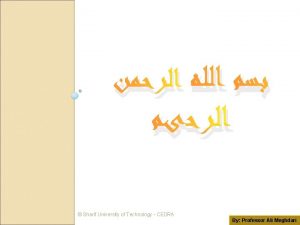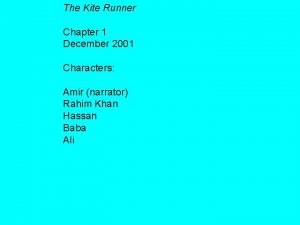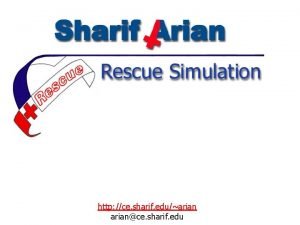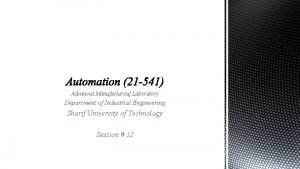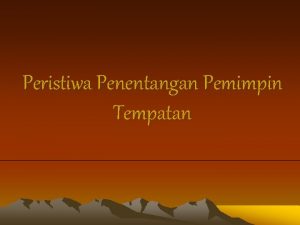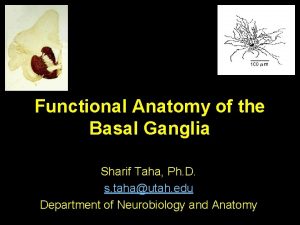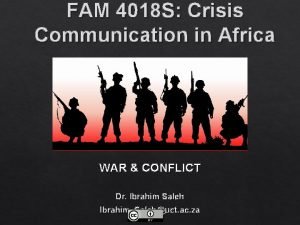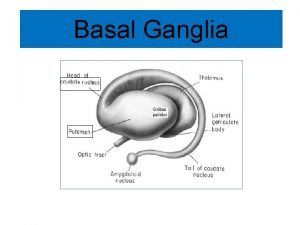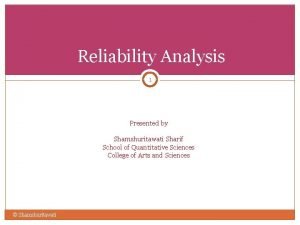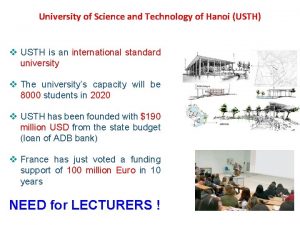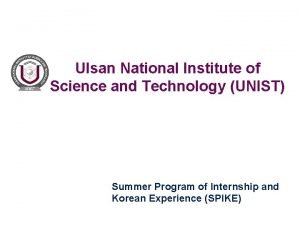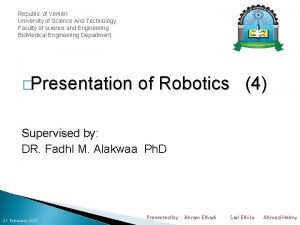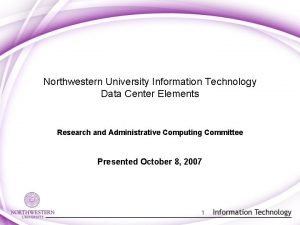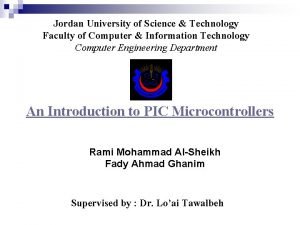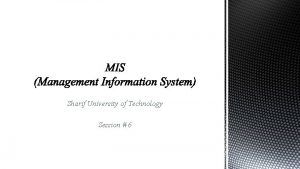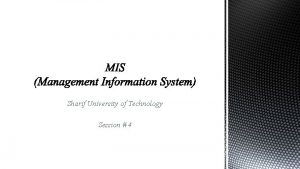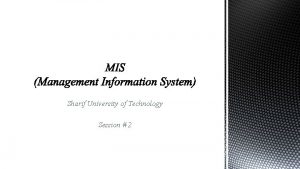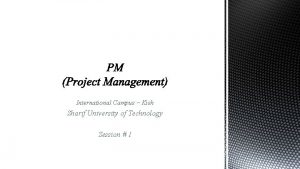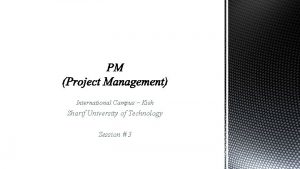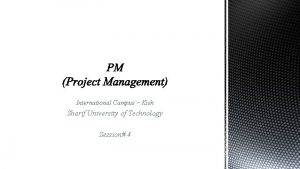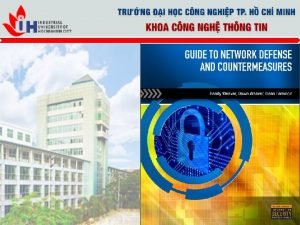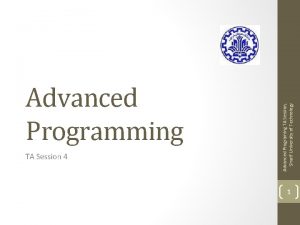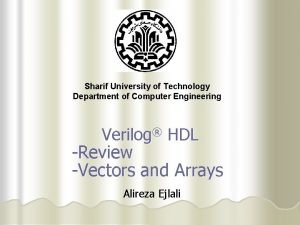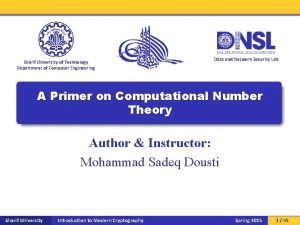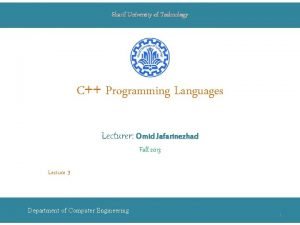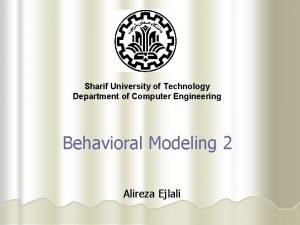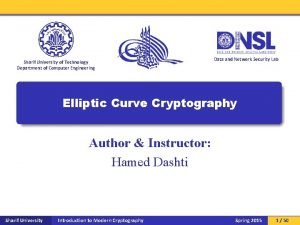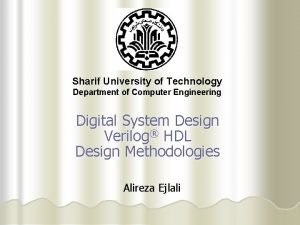Sharif University of Technology Session 3 Contents Systems
























- Slides: 24

Sharif University of Technology Session # 3

§ Contents § Systems Analysis and Design Sharif University of Technology MIS (Management Information System), Session # 3 2

§ Information system development project § Realistic behavior Sharif University of Technology MIS (Management Information System), Session # 3 3

§ Information system development project Tiers of Software Development System Development Life Cycle (SDLC) Sharif University of Technology MIS (Management Information System), Session # 3 4

§ System Development Life Cycle (SDLC) § The basis for most systems analysis and design methodologies is the system development life cycle or SDLC. § It is sometimes called the waterfall method because the model visually suggests work cascading from step to step like a series of waterfalls. § In reality, there is considerable feedback between the various steps or phases. Sharif University of Technology MIS (Management Information System), Session # 3 5

§ SDLC Sharif University of Technology MIS (Management Information System), Session # 3 6

§ Information system development Methodologies § Several models exist to streamline the development process. § Sometimes a combination of the models may be more suitable § § § Waterfall model Unified software development Process model Spiral model Agile development Rapid application development Sharif University of Technology MIS (Management Information System), Session # 3 7

§ Information system development Methodologies § Waterfall model § The waterfall model is a sequential design process 1. Requirements specification 2. Design 3. Construction (implementation or coding) 4. Integration 5. Testing and debugging 6. Installation 7. Maintenance Sharif University of Technology MIS (Management Information System), Session # 3 8

§ Information system development Methodologies § Waterfall model § The waterfall model maintains that one should move to a phase only when its preceding phase is completed and perfected. § Time spent early on making sure requirements and design are correct saves much time and effort later § Waterfall model places emphasis on documentation (such as requirements documents and design documents) as well as source code. § Waterfall model for is a simple approach and is more disciplined. Sharif University of Technology MIS (Management Information System), Session # 3 9

§ Information system development Methodologies § Waterfall model is a bad idea in practice § It is impossible to finish a phase of a software product's lifecycle perfectly before moving to the next phases and learning from them § Many of the system's details only become known to us as we progress in the system's implementation. § Some of the things that we learn invalidate our design and we must backtrack Sharif University of Technology MIS (Management Information System), Session # 3 10

§ Information system development Methodologies § SSADM (Structured systems analysis and design method) SSADM techniques § The three most important techniques: § Logical data modeling § Data Flow Modeling § Entity Event Modeling Structured Systems Analysis and Design Method (SSADM) Sharif University of Technology MIS (Management Information System), Session # 3 11

§ Information system development Methodologies § USDP model § The USDP is a popular iterative and incremental software development process framework. Sharif University of Technology MIS (Management Information System), Session # 3 12

§ Information system development Methodologies § USDP model § Iterative and Incremental § Use Case Driven § Architecture Centric § Risk Focused Sharif University of Technology MIS (Management Information System), Session # 3 13

§ Information system development Methodologies § RUP (Rational Unified Process) is a specific implementation of the USDP. § RUP is based on a set of building blocks, or content elements, describing § what is to be produced, § the necessary skills required § and the step-by-step explanation describing how specific development goals are to be achieved. § The main building blocks, or content elements, are the following: § Roles (who) – A Role defines a set of related skills, competencies and responsibilities. § Work Products (what) – A Work Product represents something resulting from a task, including all the documents and models produced while working through the process. § Tasks (how) – A Task describes a unit of work assigned to a Role that provides a meaningful result. Sharif University of Technology MIS (Management Information System), Session # 3 14

§ Information system development Methodologies § RUP (Rational Unified Process) § Within each iteration, the tasks are categorized into nine disciplines: § Six "engineering disciplines" Business Modeling § § § Requirements Analysis and Design Implementation Test Deployment § Three supporting disciplines § Configuration and Change Management § Project Management § Environment Sharif University of Technology MIS (Management Information System), Session # 3 15

Sharif University of Technology MIS (Management Information System), Session # 3 16

Sharif University of Technology MIS (Management Information System), Session # 3 17

§ Information system development Methodologies § Spiral model § The spiral model combines elements of both design and prototyping-in-stage. § Spiral model combines advantages of top-down and bottom-up concepts. Sharif University of Technology MIS (Management Information System), Session # 3 18

§ Information system development Methodologies § Spiral model Sharif University of Technology MIS (Management Information System), Session # 3 19

§ Information system development Methodologies § Spiral model § The spiral model combines the idea of iterative development with the systematic, controlled aspects of the waterfall model. § The spiral model is based on continuous refinement of key products for requirements definition and analysis, system and software design, and implementation (the code). § Documents are produced when they are required, and the content reflects the information necessary at that point in the process. § Spiral model forces early user involvement in the system development effort. Sharif University of Technology MIS (Management Information System), Session # 3 20

§ Information system development Methodologies § Agile software development is a group of software development methods based on iterative and incremental development, where requirements and solutions evolve through collaboration between selforganizing, cross-functional teams. § It promotes adaptive planning, evolutionary development and delivery, a time-boxed iterative approach. Sharif University of Technology MIS (Management Information System), Session # 3 21

§ Information system development Methodologies § Agile software development methods § Agile Unified Process (AUP) § Crystal Clear § Crystal Methods § Dynamic Systems Development Method (DSDM) § Extreme Programming (XP) § Feature Driven Development (FDD) § Lean software development Sharif University of Technology MIS (Management Information System), Session # 3 22

§ Information system development Methodologies § Rapid Application development § Rapid application development (RAD) is a software development methodology that uses minimal planning in favor of rapid prototyping. § The lack of extensive pre-planning generally allows software to be written much faster, and makes it easier to change requirements. Rapid Application Development (RAD) Sharif University of Technology MIS (Management Information System), Session # 3 23

§ Information system development Methodologies § Rapid Application development § Requirements Planning phase § User design phase § Construction phase § Cutover phase Sharif University of Technology MIS (Management Information System), Session # 3 24
 Sharif university of technology
Sharif university of technology Muhammad nawaz sharif university of agriculture
Muhammad nawaz sharif university of agriculture Fordham university summer session
Fordham university summer session Ahmad zahir kite runner
Ahmad zahir kite runner Mail.ce.sharif
Mail.ce.sharif Webhassan
Webhassan Faisal mosque
Faisal mosque Edu.sharif.edu
Edu.sharif.edu My.edu.sharif
My.edu.sharif Sebab penentangan sharif masahor di sarawak
Sebab penentangan sharif masahor di sarawak Peristiwa penentangan sharif masahor
Peristiwa penentangan sharif masahor Cw.sharif edu
Cw.sharif edu Sharif
Sharif Peristiwa penentangan rentap terhadap james brooke
Peristiwa penentangan rentap terhadap james brooke Bg
Bg Behjat sharif
Behjat sharif Lentiform nucleus
Lentiform nucleus Ayan sharif
Ayan sharif Shamshuritawati sharif
Shamshuritawati sharif Pico and finer
Pico and finer Hanoi university of science and technology vietnam
Hanoi university of science and technology vietnam Unist application fee
Unist application fee Science technology university yemen
Science technology university yemen Northwestern university information technology
Northwestern university information technology Jordan university of science and technology
Jordan university of science and technology
